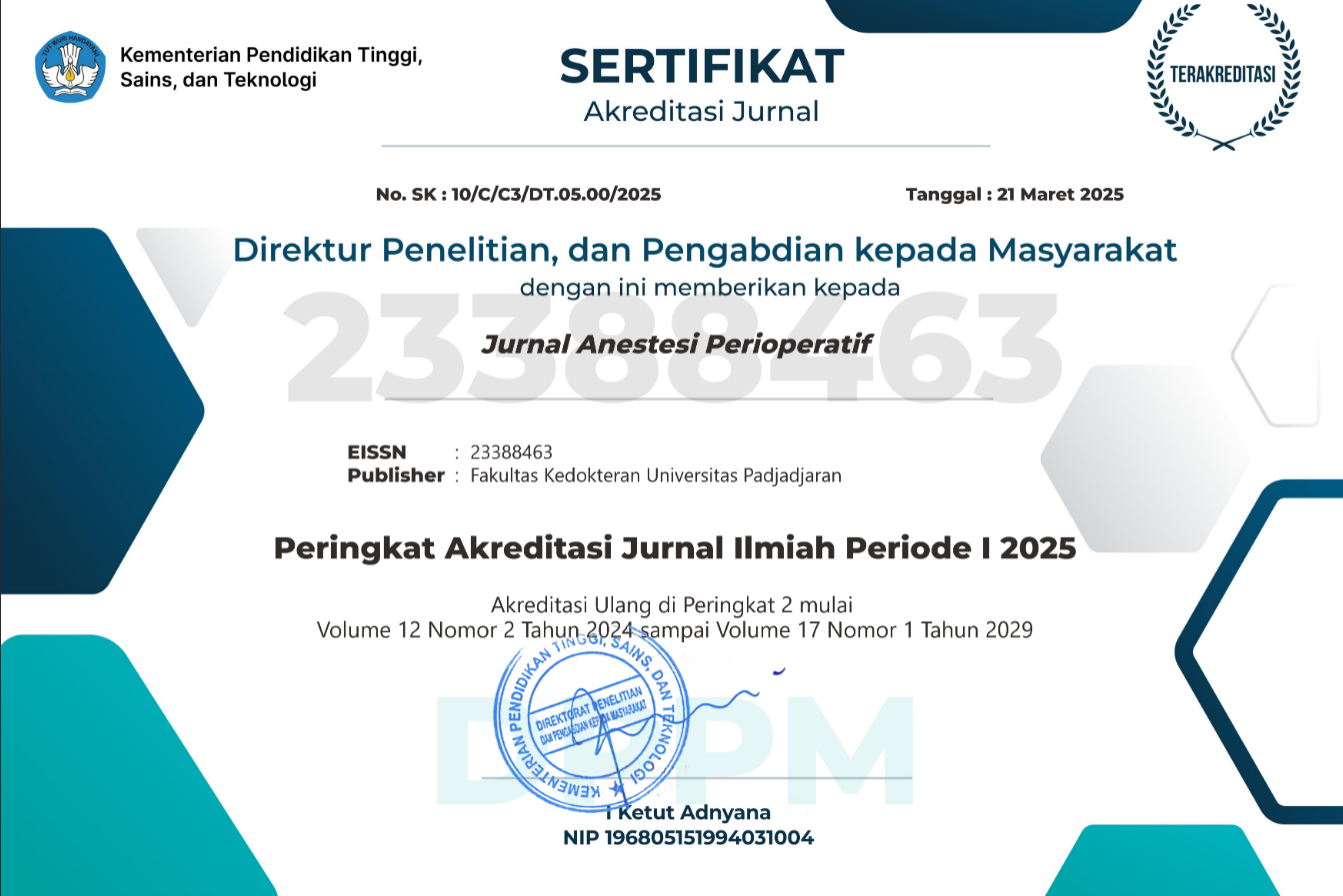Gambaran Mortalitas Pasien Sepsis Berdasarkan Fluid Accumulation di ICU RSUP Dr. Hasan Sadikin Bandung Tahun 2021–2022
Abstract
Manajemen cairan pasien sakit kritis memiliki risiko terjadinya akumulasi cairan. Resusitasi cairan merupakan bagian penting dalam menstabilkan status hemodinamik dan meningkatkan oksigenasi jaringan. Beberapa penelitian telah menunjukkan bahwa balans cairan kumulatif positif merupakan faktor prognostik yang kuat untuk mortalitas pasien sepsis. Tujuan penelitian ini adalah mengetahui gambaran mortalitas pada pasien sepsis yang mengalami akumulasi cairan selama dirawat di ICU RSUP Dr. Hasan Sadikin Bandung Tahun 2021–2022. Metode pengambilan sampel dilakukan dengan teknik consecutive sampling secara retrospektif melalui rekam medis pasien sepsis yang mengalami akumulasi cairan di ICU RSUP Dr. Hasan Sadikin Bandung selama periode 1 Januari 2021–31 Desember 2022 dengan jumlah sampel adalah 107 orang subjek penelitian. Analisis menunjukkan bahwa karakteristik pasien relatif sama antara kelompok yang mengalami mortalitas dan yang bertahan hidup. Pada kategori akumulasi cairan >10%, semua pasien (100%) mengalami mortalitas, sedangkan pada kategori akumulasi cairan <10%, 27 pasien (51,9%) meninggal dan 25 pasien (48,1%) bertahan hidup.
Keywords
Full Text:
PDFReferences
- Shen Y, Huang X, Zhang W. Association between fluid intake and mortality in critically ill patients with negative fluid balance: a retrospective cohort study. Criti Care. 2017;21(1):104.
- Simpson SQ. IRS in The time of Sepsis-3. American College of CHEST Physicians. Chest journal. 2018;153(1):34–8.
- Singer M, Deutschman CS, Seymour CW, Shankar-Hari M, Annane D, Bauer M, dkk. The third international consensus definitions for sepsis and septic shock (Sepsis-3). JAMA. 2016;315(8):801–10.
- PERDICI. Penatalaksanaan sepsis dan syok Sepsis Optimalisasi FASTHUGBID. Edisi ke-1. Pangalila FJV, Manshoer A, penyunting. Jakarta; 2017. hlm. 1–3.
- Sakr Y, Jaschinski U, Wittebole X, Szakmany T, Lipman J, Nñamendys-Silva SA, dkk. Sepsis in intensive care unit patients: worldwide data from the intensive care over nations audit. Open Forum Infect Dis. 2018;5(12):313.
- Data Reports | Sepsis | CDC [Internet]. [diunduh 30 Juli 2020]. Tersedia dari: https://www.cdc.gov/sepsis/datareports/index.html.
- Southeast Asia Infectious Disease Clinical Research Network. Causes and outcomes of sepsis in Southeast Asia: a multinational multicentre cross-sectional study. Lancet Glob Health. 2017;5(2):157–67.
- McBride A, Chanh HQ, Fraser JF, Yacoub S, Obonyo NG. Microvascular dysfunction in septic and dengue shock: pathophysiology and implications for clinical management?. Glob Cardiol Sci Pract. 2020;2020(2):e202029.
- Bagshaw SM, Bellomo R. The influence of volume management on outcome. Curr Opin Crit Care. 2007;13(5):541–8.
- Dellinger RP, Levy MM, Rhodes A, Annane D, Gerlach H, Opal SM, dkk. Surviving sepsis campaign: international guidelines for management of severe sepsis and septic shock, 2012. Intensive Care Med. 2013;39:1652–88.
- Brown RM, Semler MW. Fluid management in sepsis. J Intensive Care Med. 2019;34(5):364–73.
- Garcia X, Gruartmoner G, Mesquida J. Fluid Optimization Strategies in Critical Care Patients. OA Critical Care 2013;1(1):4
- Garcia X, Gruartmoner G, Mesquida J. Fluid optimization strategies in critical care patients. OA Crit Care. 2013;1(1):4.
- Pudjiadi A. Resusitasi cairan: dari dasar fisiologis hingga aplikasi klinis. Sari Pediatri. 2017;18(5):409–16.
- Mele A, Cerminara E, Habel H, Galvez BR, Oldner A, Nelson D. Fluid overload and major adverse kidney events in sepsis: a multicenter observational study. Ann Intensive Care. 2022;12(1):62.
- Granado RCD, Mehta RL. Fluid overload in the ICU: evaluation and management. BMC Nephrol. 2016;17(1):109.
- Mehta RL, Bouchard J. Controversies in acute kidney injury: effects of fluid overload on outcome. Contrib Nephrol. 2011;174:200–1.
- Bagshaw SM, Cruz DN. Fluid overload as a biomarker of heart failure and acute kidney injury. Contrib Nephrol. 2010;164:54–68.
- Messmer AS, Zingg C,Muller M, Gerber JL, Schefold JC, Pfortmueller CA. Fluid overload and mortality in adult critical care patients-a systematic review and meta-analysis of observational studies. Crit Care Med. 2020;48(12):1862–70.
- Sirvent JM, Ferri C, Baró A, Murcia C, Lorencio C. Fluid balance in sepsis and septic shock as a determining factor of mortality. Am J Emerg Med. 2015;33(2):186-189.
- Bauer M, Gerlach H, Vogelmann T, Preissing F, Stiefel J, Adam D. Mortality in sepsis and septic shock in Europe, North America and Australia between 2009 and 2019—results from a systematic review and meta-analysis. Crit Care. 2020;24(239):1–9.
- Nasir N, Jamil B, Siddiqui S, Iqbal NT, Khan F, Hussain R. Mortality in sepsis and its relationship with gender. Pak J Med Sci. 2015;31(5):1201–6.
- Mohan A, Shrestha P, Guleria R, Pandey R, Wig N. Development of a mortality prediction formula due to sepsis/severe sepsis in a medical intensive care unit. Lung India. 2015;32(4):313–9.
- Papathanassoglou E, Middleton N, Benbenishty J, Williams G, Christofi MD, Hegadoren K. Systematic review of gender–dependent outcomes in sepsis. Nurs Crit Care. 2017;22(5):284–92.
- Failla KR, Connelly CD. Systematic review of gender differences in sepsis management and outcomes. J Nurs Scholarsh. 2017;49(3):312–24.
- Pepper DJ, Sun J, Welsh J, Cui X, Suffredini AF, Eichacker PQ. Increased body mass index and adjusted mortality in ICU patients with sepsis or septic shock: a systematic review and meta-analysis. Crit Care. 2016;20(181):1–10.
- Hillenbrand A, Xu P, Zhou S, Blatz A, Weiss M, Hafner S, dkk. Circulating adipokine levels and prognostic value in septic patients. J Inflamm. 2016;13(30):1–7.
- Wang Y, Ming Y. Effects of fluid balance on prognosis of acute respiratory distress syndrome patients secondary to sepsis. World J Emerg Med. 2020;11(4):216–22.
- Gusriadi, Salam SH, Hisbullah H, Arif SK,Rum M, Palinrungi AS. The association of cumulative fluid balance and sepsis patient mortality during treatment in the intensive care unit. Nusantara Med J. 2022;7(2):1–10.
- Shen Y, Huang X, Cai G, Xu Q, Hu C, Ma C, dkk. Impact of fluid balance on mortality is mediated by cumulative fluid index in sepsis: a cohort study. J Intensive Care Med. 2021;36(12):1458–65.
DOI: https://doi.org/10.15851/jap.v12n2.3717
Article Metrics
Abstract view : 922 timesPDF - 508 times
This Journal indexed by

JAP is licensed under a Creative Commons Attribution-NonCommercial 4.0 International License
View My Stats



